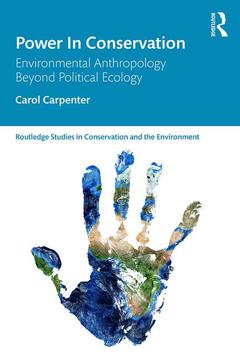Power in Conservation Environmental Anthropology Beyond Political Ecology Routledge Studies in Conservation and the Environment Series

This book examines theories and ethnographies related to the anthropology of power in conservation.
Conservation thought and practice is power laden?conservation thought is powerfully shaped by the history of ideas of nature and its relation to people, and conservation interventions govern and affect peoples and ecologies. This book argues that being able to think deeply, particularly about power, improves conservation policy-making and practice. Political ecology is by far the most well-known and well-published approach to thinking about power in conservation. This book analyzes the relatively neglected but robust anthropology of conservation literature on politics and power outside political ecology, especially literature rooted in Foucault. It is intended to make four of Foucault?s concepts of power accessible, concepts that are most used in the anthropology of conservation: the power of discourses, discipline and governmentality, subject formation, and neoliberal governmentality. The important ethnographic literature that these concepts have stimulated is also examined. Together, theory and ethnography underpin our emerging understanding of a new, Anthropocene-shaped world.
This book will be of great interest to students and scholars of conservation, environmental anthropology, and political ecology, as well as conservation practitioners and policy-makers.
1. Introduction 2. Discourses and their Power in Foucault 3. Seminal Works on the Power of Discourses 4. Discourses of Conservation 5. The Triangle in Foucault 6. Sovereignty, Discipline, and Governmentality in Ethnographies 7. States and Centers, Simplifying and Calculating 8. Articulations between Knowledges in Ethnographies 9. Subject Formation in Foucault 10. Subject Formation in Ethnographies 11. Capitalism and Neoliberal Governmentality in Foucault 12. Cultivating Neoliberal Subjects in Ethnographies 13. The Economy in Ethnographies 14. The Invisibility of Implementation and Governmentality 15. Practices of Assemblage and Assemblages of Effects 16. Universals, Collaborations, and Global Agreements 17. World-Making in the Anthropocene 18. Conclusion
Carol Carpenter is Senior Lecturer in the School of Forestry and Environmental Studies at Yale University, US. She is co-editor of Environmental Anthropology: A Historical Reader (2007).
Date de parution : 07-2020
15.6x23.4 cm
Date de parution : 07-2020
15.6x23.4 cm
Thème de Power in Conservation :
Mots-clés :
Queen Excluder; Van Reede; philosopher Foucault's; Vice Versa; neoliberal governmentality; Environmental Anthropology; UN; capitalism; Lore Lindu National Park; political ecology; Author’s Italics; Honey Hunting; Local Knowledge; Redd; Supply Chain Capitalism; Indigenous Environmental Knowledge; Political Ecologists; Immutable Mobiles; Donald Moore; Subject Formation; Integrated Pest Management; Forest Councils; Anti-politics Machine; American Neoliberalism; Discursive Practices; Community Driven Development; Geological Subjects; David Mosse; Meratus Dayak


